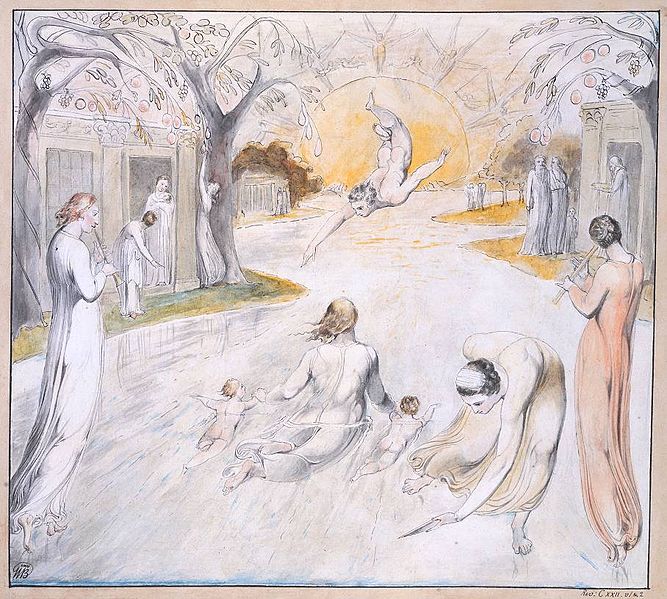First posted June 2013
Who among us shall dwell with everlasting burnings? (Isaiah 33:14)
No one knows of the Beyond. Still men throughout history have seen visions of it. These visions have informed their faith and galvanized them to the words and deeds by which they have lived. Look now at Blake's visions of Heaven and Hell:
For Isaiah (and Blake) 'everlasting burnings' had connotations opposite to those of conventional thinking.
Indeed throughout the Bible fire symbolizes God more often than the Devil: " our God is a consuming fire". Note also the burning bush seen by Moses and the forks of flame at Pentecost. In Eden every bush burns and flaming tongues fill the air; Blake referred to them as burning arrows of thought.
Blake's eternity, both here and hereafter, is characterized by two intense activities, War and Hunting.
 |
Wikimedia Commons River of Life |
Milton, Plate 35, (E135)
"And War & Hunting: the Two Fountains of the River of Life
Are become Fountains of bitter Death & of corroding Hell"
Both
are intellectual in nature and aimed at growth into Truth. In this
world they have been prostituted into "corporeal war" and the killing of
the innocent. War and Hunting of course exhaust the Eternals, so
periodic rest is provided in what might be called Lower Heaven; Blake
called it Beulah:
Four Zoas, Night 1, (E 303)
"There
is from Great Eternity a mild & pleasant rest Nam'd
Beulah, a soft
Moony Universe, feminine, lovely,
Pure, mild & Gentle, given in
Mercy to those who sleep,
Eternally created by the Lamb of God around,
On all sides, within & without the Universal Man."
We could also call Ulro "this world". In a sense "this world" is as
close to the conventional hell as Blake got. In Blake as in the Bible,
especially in Paul, "this world" has a technical meaning. It does not
mean the present stage of life as opposed to a heavenly (or hellish)
existence beyond physical death. Basically "this world" means a level of
consciousness that sees only the material, which Blake called the
corporeal. Ulro is the state in which "Reality was forgot, and the
Vanities of Time and Space only Remembered and called Reality" (Vision
of the Last Judment, (E 555); his comments on an astounding canvas;
it concerns Revelation 20:11-15).
Ulro, Blake's hell, denotes a form of blindness or sleep, from which one may awaken:
Ulro, Blake's hell, denotes a form of blindness or sleep, from which one may awaken:
This is his theme, Blake tells us. Students of the New Testament know that sleep and waking are thoroughly biblical figures for the spiritual realities which concerned Blake here. He envisioned Eternal Death as the fallenness of "this world" through which we pass before "awaking to Eternal Life". Blake thus saw hell as man's fallen state before the coming of Jesus to awaken us and set us free.
The biblical writers as they are generally understood had not
adequately grasped the fullness of Jesus' power to rescue mankind
totally from the darkness which Blake called Eternal Death. They wrote
most of the New Testament in a time of persecution. In their effort to
stiffen the spine of the believer in the face of that persecution they
retreated into a degree of thralldom to the Old Testament God of Wrath,
in the spirit of Jonathan Edwards' sermon, "Sinners in the Hands of an
Angry God".
One can readily understand why the worldly ecclesiastics who followed
Peter and Paul picked up on the angry God. All too often he became their
primary weapon; the image of hell is the ultimate form of coercion.
Blake made no such mistake, probably because of the ten years which he
had spent confronting and subduing that "shadow from his wearied
intellect", years of suffering, but it turned to glory.
In those years he laid to rest the Punisher who has afflicted the minds
of believers through the centuries, but he retained the creative
possibility which represents the best of the Christian faith. The
rationalists and deists had thrown out both and confined us to Ulro,
which today threatens to engulf mankind. The reader must decide for
himself whose hell is most real--the place of unending punishment or the
sleep from which man may awaken.

No comments:
Post a Comment